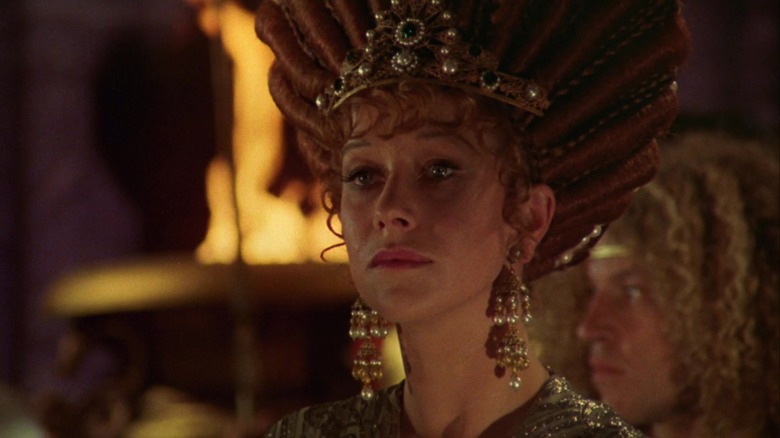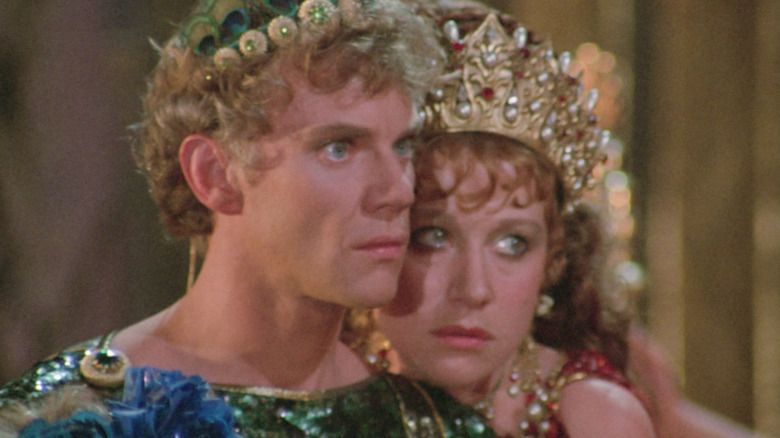Helen Mirren's Controversial Historical Epic Was Banned During Its Initial Release
Tinto Brass' 1979 Roman orgy movie "Caligula" is one of the more notorious cult films of its era. It wears the cloak of an award-bait prestige picture, but is also an infamously terrible piece of slapped-together art porn. Made for a budget of over $17 million, "Caligula" boasted impressive performances from classy, world-famous actors such as John Gielgud and Peter O'Toole. Malcolm McDowell, having already appeared in dark, violent pictures such as "If...." and "A Clockwork Orange," was right at home in the title role, playing Rome's mad emperor with his trademark verve. Helen Mirren played Caesonia, a courtesan that Caligula marries to the consternation of his sister Drusilla (Teresa Ann Savoy), also his incestuous lover.
Noted author and media bon vivant Gore Vidal was paid $200,000 to write the screenplay for "Caligula," but insisted his name be removed after lengthy scenes of sex and violence were added to the film without his input. Director Tinto Brass was already known for his titillating softcore movies, and the real-life emperor Caligula was infamous for his sexual proclivities, so some sex was always going to be part of "Caligula." But producer Bob Guccione — the founder of Penthouse Magazine — felt the movie wasn't nearly sexy enough, causing him to fire Brass before editing began. Guccione hired a secondary director, Giancarlo Lui, to direct several scenes of hardcore sex that he could edit in later.
The X-rated cut of "Caligula" was a lugubrious 148 minutes, while a wholly uncut version runs 156 minutes. An R-rated cut, only 102 minutes, was more widely distributed. It's likely that "Caligula" was inspired by the arthouse success of Pier Paolo Pasolini's 1975 drama "Salò, or the 120 Days of Sodom," based on a novel by the Marquis de Sade. Savoy, at the very least, appeared in both. The film has been famously banned in many places. It was barred from a theater in Akron, Ohio, for instance, as reported by the Akron Beacon at the time, and it remained banned in Australia until 2021.
Caligula had a messy production and many legal issues
"Caligula" wasn't a huge hit, but its notoriety inspired a slew of ripoffs and unauthorized sequels that crept around the Eurosleaze circuit for years. 1977's "The Gestapo's Last Orgy" was re-branded as "Caligula Reincarnated as Hitler," plus Bruno Mattei directed a knockoff called "Caligula Reincarnated as Nero." Bruno Corbucci used the "Caligula" sets to film a sex comedy called "Messalina, Messalina!," which was retitled "Caligula: Sins of Rome" when released Stateside. There was also a super-gross ripoff in 1982 called "Caligula... The Untold Story." Fun trivia, David Cain Haughton from "Ator 2: Orion the Invincible" — better known to "Mystery Science Theater 3000" fans as "Cave Dwellers" — played Caligula in "The Untold Story."
It was a big deal. No one who worked on the film liked it. Tinto Brass resented that Guccione filmed hardcore sex scenes without his knowledge, and fought to have his name removed just as Vidal had. The film has no credited editor, having been recut multiple times by multiple people. Stars also famously dropped out. Orson Welles turned down $1 million to be in the film and Maria Schneider left production when she learned how much sex there would be in the picture. The background is stocked up with former Penthouse Pets, and the decadent Roman senators were played by Guccione's personal friends, many of them professed anarchists and ex-cons.
The release of "Caligula" was also a nightmare. Because of the sex scenes, "Caligula" was seized by authorities in New York, Boston, Atlanta, and the state of Wisconsin, potentially facing censorship for its obscenity. In all cases, though, the film was not declared obscene and was granted a release. That didn't stop individual theaters (as in Akron) from banning the film from exhibition. Penthouse Magazine, who handled its distribution, didn't fight minor cases such as this, and the ban was allowed to stand in certain communities. The film wasn't judged obscene in Akron, but, according to the Beacon article, was banned nonetheless.
Caligula is the hottest, messiest hot mess you've ever seen
How is the movie? It's a mess. The themes of Roman decadence fall away underneath a sea of distracting sex. The film does say that madness and idiocy, when coming from a high enough position in power, is not only tolerated, but begins to inform the character of the nation. When the madman assumes he is correct about everything, and that his depraved actions are blessed by the gods, he never sees a reason to stop. That sort of theme plays depressingly salient in 2025.
But the film is nigh unwatchable. It's chaotically edited, emerging more as a miasma of sex and violence than a well-constructed cinematic narrative. There's screaming and moaning and bleeding, leaving the viewer dizzy, confused, and aroused simultaneously. Eventually, your brain begins to smear together the decapitation scenes with the on-camera fellatio. Roger Ebert famously walked out of it — he saw the 170-minute cut — finding it to be aggressively depraved. His zero-star review is one of the critic's best.
The troubled production is the stuff of movie legend. Books are devoted to it. In 2023, a producer and film historian named Thomas Negovan re-cut "Caligula" again to closely reflect how it was written by Gore Vidal. He was able to gather footage previously locked in a Penthouse vault and put together what was, after all was said and done, a cogent motion picture. Tinto Brass hated the re-edit, knowing it still wasn't his intended vision, although Malcolm McDowell appreciated that his performance was finally available in its entirety (he remains proud of his work on "Caligula"). The new cut, which runs 178 minutes, still isn't great, according to critics. But, at long last, it's a real movie. Sadly, no cuts of "Caligula" are currently on streaming, nor are any of the sleazy knockoffs. True explorers of cinema's deepest trenches, however, know where to find it.


